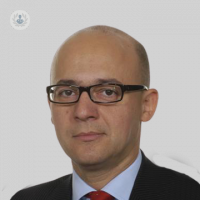Adrenal glands surgery: what to expect
Written by:Adrenal glands are extremely important, which means surgery is required when there is a problem with them. Expert endocrine surgeon Mr Radu Mihai explains what patients should expect when undergoing this procedure.

What is the purpose of the adrenal glands?
There is one adrenal gland above each kidney. The middle part of the gland (medulla) produces hormones like adrenaline, important for "flight or fight" responses to stressful situations. The periphery of the gland (cortex) produces a combination of steroid hormones involved in blood pressure control (aldosterone) and maintenance of energy levels and sugar levels (cortisol).
When is adrenal glands surgery necessary?
Several different types of patients are referred for adrenal surgery:
- Functional tumours - Tumours growing from adrenal tissue can produce excess amounts of hormones and this can lead to severe symptoms or can change the appearance of the body (vide infra).
- Metastases - Patients treated for other cancers can be found to have a spread of their primary tumour (metastasis) into the adrenal gland. When there is no other sign of metastases in other parts of the body, removing the adrenal gland can remove the only known area of malignant disease. Lung, colon, renal, breast cancers and melanomas are the most common indication. As the efficacy of other treatments for cancer patients has increased, an increasing number of patients with such tumours are being referred for adrenal surgery.
- Adrenal cancer - This is an exceedingly rare cancer with very aggressive behaviour. Radical surgery, potentially involving removing surrounding organs (spleen, kidney, local lymph nodes) remains the best chance for improving survival.
- Bilateral adrenal surgery - Both adrenal glands can produce too much cortisol under the drive of excessive secretion of ACTH from pituitary tumours or from other cancers (e.g. carcinoids). If the source of ACTH secretion cannot be removed surgically, removing both adrenal glands stops of excessive cortisol secretion and allows improvement of symptoms.
What symptoms are associated with both benign and malignant tumours of the adrenal glands?
Too much adrenaline secretion from tumours growing from the medulla (phaeochromocytomas) leads to episodes of severe headaches, palpitations, sweating, increased blood pressure and possible feelings of ‘doom and gloom’.
Excessive cortisol secretion (a condition named after a famous neurosurgeon from early 20th century, Harvey Cushing) leads to additional deposition of fat on the abdomen, back (buffalo hump) and face (moon face) associated with muscle weakness, bruising, diabetes and hypertension.
Too much aldosterone secretion (hyperaldosteronism, Conn’s syndrome) leads to hypertension possibly associated with low blood levels of potassium (hypokaleamia). Adrenal cancers present usually as a very large mass creating local compressive symptoms or as rapidly progressing symptoms suggestive of Cushing disease and signs of excess hormones from the other gender (i.e. virilization in women with increased facial and body hair or feminisation in men with the appearance of breast enlargement).
What happens during adrenal glands surgery?
Most adrenal operations are done as a key-hole procedure, either from the front (laparoscopic surgery) or from the back (retroperitoneoscopic surgery). In such cases, three or four small cuts are made to introduce the operating instruments that are used to do the entire operation based on images obtained through the camera. The other organs surrounding the adrenal gland (liver, spleen, tail of pancreas) are moved away to allow to demonstrate the main veins connecting the adrenal gland to the vena cava (on the right) or the renal vein (on the left). Titanium clips are placed across these vessels before dividing them so that the gland can be freed from any other connections to surrounding tissues.
For the large adrenal cancers, open surgery remains the gold standard. This is generally done through a subcostal incision or through a midline incision (up-and-down).
This is an area of surgery rarely encountered in the practice of most surgeons; therefore, it is very important to ensure that the surgeon recommended has previous experience with such procedures. The Government-run a nation-wide survey of the delivery of adrenal surgery under the acronym GIRFT (get-it-right-first time) and the recommendations due to be published in the near future will recommend that adrenal surgery should be offered only by surgeons doing at least 6 operations per year (with this threshold being 12 adrenal operations per year for more complex cases such as phaeochromocytomas and adrenal cancer).
What instructions will be advised to follow once discharged from the hospital?
Similar to other key-hole operations, patients who have had laparoscopic adrenal surgery are advised to observe the healing of the skin incisions to ensure there is no suspicion of wound infection (very rare occurrence as this is ‘clean surgery’). They should not lift anything too heavy that would cause them to hold their breath for 6 weeks in order to allow for the muscles to repair.
If the operation was done for Conn’s syndrome, their antihypertensive medication will be reduced and they should monitor the blood pressure regularly. It is likely that the majority of them will be on a much lower number of drugs (or none!) needed to maintain normal blood pressure. They should also have a blood test to check potassium levels some 4 weeks after the operation.
When the adrenalectomy is done for Cushing syndrome, patients are discharged on steroid replacement, usually oral hydrocortisone tablets on a dose of 25 mg/day with the advice to slowly decrease the daily amount (exact details to be confirmed by the surgical and endocrine team).
Those with metastases into the adrenal gland need no special medication as the remaining adrenal gland should work normally, without the need to take any hormone replacement.
The care of patients with adrenocortical cancer is complex and input from surgical, endocrine and oncological teams is necessary during their recovery and during subsequent follow-up.
What will life look like for a patient without their adrenal glands?
Losing one adrenal gland should lead to no changes to daily life because the remaining adrenal gland functions normally and can compensate for the loss of the other gland. When both adrenal glands are removed, life is sustainable only if steroid replacement is rigorously implemented. All patients need to take hydrocortisone tablets three times per day and an aldosterone replacement (fludrocortisone) once per day. They should receive advice about increasing the dose of steroids during any stressful periods (such as a viral disease, an accident). It is advisable for all such patients to wear a medical alert bracelet. When they travel abroad, they should carry an emergency supply of intravenous steroids in case they are admitted to a hospital where initial care might be difficult because of language barriers.
For more detailed information regarding adrenal surgery please visit www.adrenalsurgeryoxford.co.uk
You can find more information about procedures performed by Mr Mihai by visiting his Top Doctors profile, where you can also view his availability and request an appointment.


